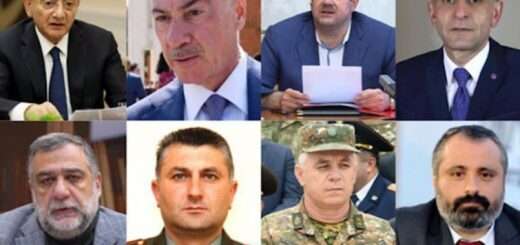Azerbaijan Demolishing Artsakh Parliament Building

• Susan Badalian
RFE/RL Armenian Service
Azerbaijan appears to have started demolishing a building in Stepanakert that housed Nagorno-Karabakh’s parliament for almost two decades.
A short video circulated by Azerbaijani pro-government media on Monday showed an excavator working at the site of the mostly ruined building that was shaped like a traditional Armenian church.
The marble structure constructed in the early 2000s was located at the Karabakh’s capital central square. Azerbaijan’s President Ilham Aliyev held a military parade there in November less than two months after the Azerbaijani military offensive that forced Karabakh’s practically entire population to flee to Armenia and restored Baku’s control over the region. Aliyev also made a point of voting in Stepanakert during last month’s presidential election that gave him another term in office.
Aram Harutiunian, one of the Karabakh lawmakers exiled in Armenia, said the demolition highlights Baku’s efforts to wipe out traces of Armenian presence in Karabakh.
“This is vivid evidence of the fact that they are destroying anything that’s Armenian also in order to erase any thought of returning home from our minds,” he told RFE/RL’s Armenian Service.
Harutiunian and other Karabakh Armenians also noticed in the Azerbaijani video a void right next to the local parliament where another, smaller building stood for more than a decade. The building served as the headquarters of an association of Karabakh veterans of the first Armenian-Azerbaijani war of 1991-1994. It appears to have been completely demolished.
“People who won the first war used to gather there, and I think this may be the reason why Azerbaijan treated that building like that,” said Harutiunian.
Even before these demolitions, Armenian and Karabakh officials accused the Azerbaijani authorities of systematically desecrating or destroying Armenian monuments in Karabakh. According to them, at least two Karabakh Armenian churches have been torn down since a Russian-brokered ceasefire stopped the six-week war in November 2020.
In early 2022, Baku announced plans to erase Armenian inscriptions from churches in parts of Karabakh retaken by it during the war. The head of the U.S. Commission on International Religious Freedom, Nadine Maenza, expressed serious concern over the decision.







